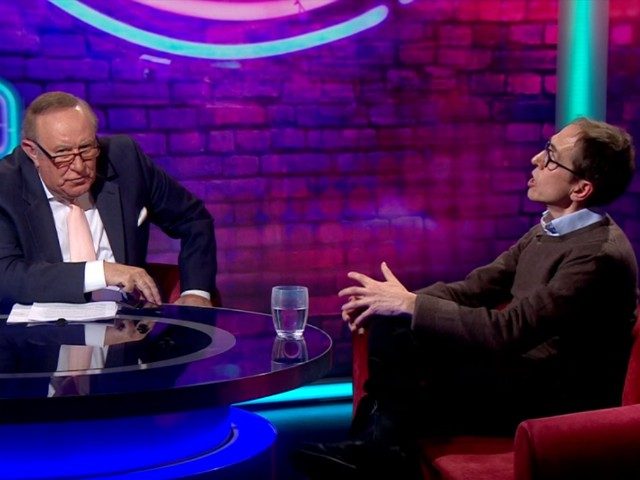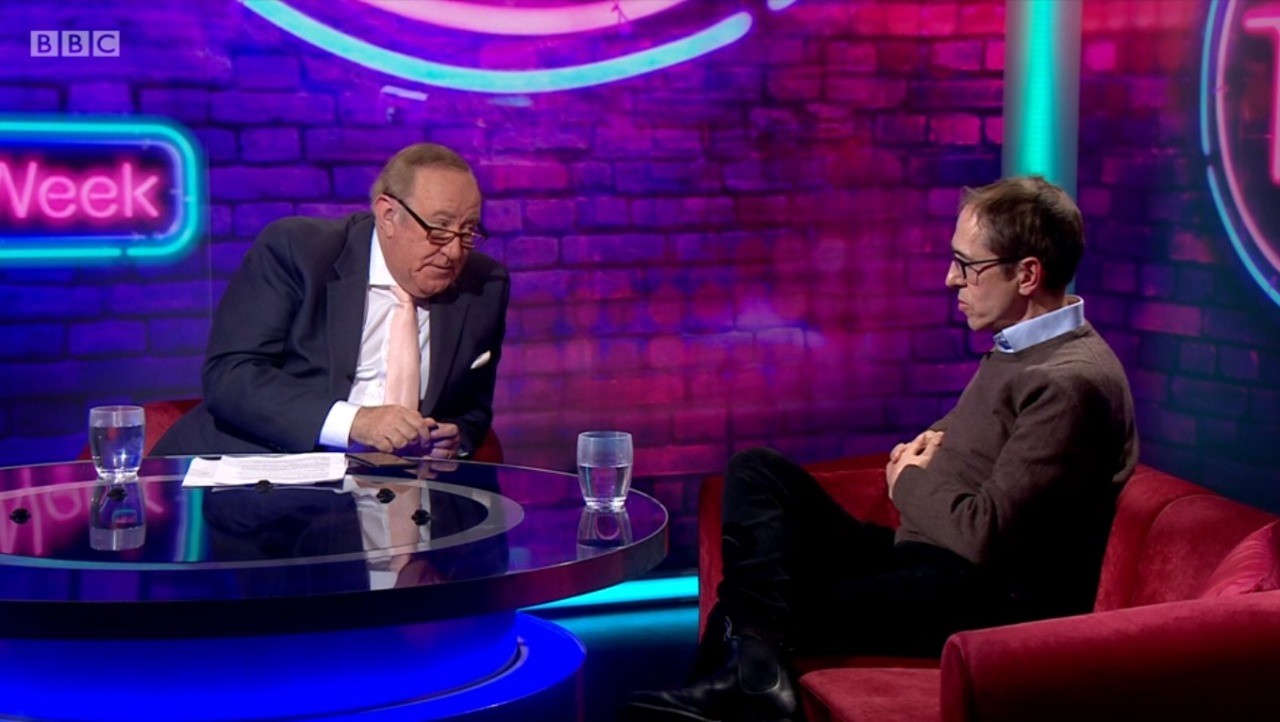Last night I died horribly in front of nearly one million viewers on the BBC political talk show This Week.
It was so unpleasant I never want to experience it again. But of course I will. Car crash moments are an inevitable consequence of appearing in the public eye — especially if like me you’re one of those chancers who prefers to leave everything to the last minute in the hope you can wing it using a mixture of charm, impish humour, and nuggets of vaguely relevant info snatched on the hoof from the recesses of your memory.
More often than not this technique works. It’s one of the reasons Oxbridge graduates tend to do well in this shallow culture of ours: their education essentially entails spending three or four years being trained in the art of bullshit.
But when you’re up against a relentless inquisitor like the BBC’s Andrew Neil it’s no use at all. He’s not there to discover how amusing you are or how eloquently you can fill the dead air. He just wants a straight answer to the question.
Last night the question he wanted answered was, essentially: how can you be so sure that a No Deal Brexit is best for Britain?
I’ll explain why in a separate post.
In this piece, though, for your delectation, amusement, and Schadenfreude, I want to dwell in a bit more detail on how it feels to be eaten alive by Britain’s fiercest interrogator. And also, to explain how I got myself in such a situation in the first place.
BBC This Week is by far my favourite politics show on TV. It’s broadcast, live, at an unconscionable hour — you don’t go on till about 11.45pm, a time when normally I’m tucked up in bed. But the lateness gives it more of an after-hours vibe, at once edgy, relaxed, playful. Chief interrogator Neil is generally much jollier, more forgiving than he is on day time shows. And the two principal guests on his sofa — usually politicians or ex-politicians like Michael Portillo — tend to be in open-necked shirt mode. There’s an end-of-term feel to the whole enterprise which makes it great fun to do, even if it’s hellishly difficult to get to sleep afterwards because of all that adrenalin that has been injected into your system around midnight.
The danger with all this set up, though, is that — whether by accident or design — it lulls you into a false sense of security.
On the afternoon before the show, you spend two or three hours filming an amusing short, which is shown prior to your grilling by Neil and his guests.
It’s such a jolly wheeze — one time I was filmed getting a haircut in a barber’s wearing a Donald Trump wig, this week I got to dress up as a zombie — that you all too easily forget that this isn’t the main event. All it is is a bit of fluff to lighten the mood and set the scene before the studio discussion proper.
Another potential pitfall is that the script you read isn’t really yours. I’m not trying to blame the BBC here: you do get given the option, if you wish, of writing your own material.
But because I’m a print journalist with a frantic schedule, a scatty brain, and not much experience of writing words for the camera, what I tend to do is get the producer to do the original draft which I then polish afterwards.
I like and trust the producer Andy. We get on really well and he’s honest, fair, and immensely professional. Perhaps though, had I thought about it a bit harder, I might have tinkered a bit more with the draft he emailed me the night before. Especially the paragraphs where I waxed lyrical about the joys of leaving on World Trade Organization terms.
My basic position on Brexit is one that I believe the majority of people who voted Leave share: all the other proposals currently being mooted from Second Referendum to Theresa May’s various withdrawal agreements (aka her “deal”) are a betrayal of the Referendum vote.
No Deal is the only option which comes even close to what we Leave voters asked for. We want out; we don’t want to pay the European Union a penny in divorce money, let alone a ludicrous £39 billion which would be so much better spent (if it has to be) on British people rather than on a corrupt, sclerotic superstate which wishes us only ill. Yes, of course there will be teething problems if there is a no deal, but they are certainly not beyond the wit of government — and more importantly, of business — to manage. Business is in the business of doing business. Britain traded perfectly well for the large chunk of history it has spent outside the European Union. Other countries — China, the U.S., India — etc, seem to survive by being outside the EU.
What I should have realised, though, was that Andrew Neil, being Andrew Neil, wasn’t going to let me off the hook with such airy assertions.
He wanted detailed analysis of those WTO terms I’d mentioned in my film — which I was quite incapable of giving because I just hadn’t boned up enough on them beforehand.
Of course I should have done. Trying to wing it in an interview with Andrew Neil is a bit like going for a dip in the river in Australia’s Northern Territory and hoping there are no crocodiles about.
Indeed, I remember a small voice in my head warning me not to be complacent. “Read a piece by Patrick Minford so you’ve got your economics right. Remind yourself of the exact tariff rate WTO rules impose on goods. Oh and have another glance at the piece that Ross Clark did on No Deal Brexit in the Spectator a couple of weeks ago,” the small voice urged.
But I didn’t — with results that were excruciatingly painful to watch on this week’s edition of This Week.
Here’s the first sign you know you’ve truly bombed in a car crash interview:
You come out of the studio and the producer immediately hands you a large slug of whisky and asks: “Are you OK?”
Next, you check your Twitter feed in the hope that maybe it wasn’t quite as bad as you feared.
Nope. Everyone is piling in on you: not just your enemies (they’ll always hate you regardless of what you do) but even people you thought were either neutrals or friends.
So you slink back to your hotel room and wonder how on earth you’re going to get to sleep. Is there some way you can trick the mind into pretending that what has just happened was really only a figment of your imagination?
Short answer: no.
Next day you wake up after a fitful night and realise that far from diminishing your nightmare has intensified. All the haters who missed your performance last night are now catching up with “James Delingpole’s car crash TV moment” on social media and eagerly sharing it with their friends.
This is almost the most painful aspect of an experience like this: the pleasure that it gives to the people in the world you most loathe and despise.
And thanks to the internet, it will be there forever: again and again the haters will come back to it, and beat themselves off over it, for what you have done is gone and provided them with the best porn material ever. They see you looking discomfited — and that pleases them. They see your case being demolished, apparently with ease by Andrew Neil, and they feel utterly vindicated in their view that Brexit should never happen and that all those who support Brexit, but most especially James Delingpole, are lower than vermin. (Many of them — being on the left, or being FBPE Europhile zealots, or both — would normally loathe Andrew Neil. But not on this occasion, “no sirree!”)
You learn a lot about how vindictive people can be when they put their warped tiny minds to it. One inventive sort — guessing, rightly, that I wouldn’t be checking my Twitter feed — got hold of my private email address and sent a message with the deceptive, business type header “Checking in”.
It read:
Hi JamesHow are things with you?
Have you recovered from the embarrassing performance on BBC This Week?
It’s always brilliant to watch you being exposed for what you really are. Oh how we laughed.Hope you arent [sic] too hurt and your ignorant ego kicks back in soon.Warm wishesCharlie
Here below are a few more examples of the kind of messages you get when the good people of Twitter have decided that you are today’s Worst Person in the World.
What it’s very important to do on these occasions, I think, is to keep a sense of perspective.
When it comes down to it, I ask myself, what did I actually do to merit this vitriol?
And the answer is: not prepare sufficiently for an interview with Andrew Neil; let down my home side by allowing Neil to make the case for Project Fear unchallenged by decent counterarguments.
Obviously, I’m going to be kicking myself for ages about the first failing.
And I do feel properly bad about the second. There are only so many opportunities we Brexiteers get to make the case for No Deal Brexit on TV — and I blew this one, no question.
That’s why, as a punishment to myself and by way of making amends, I’m now going to write another piece explaining why Andrew Neil’s case against No Deal Brexit was bollocks (as I suspect he probably knows; but playing the devil’s advocate is his job, and it’s entirely my fault for failing to take the opportunity he presented me with to explain why he was wrong).
Do I wish this horrible experience had never happened to me?
Of course. But there’s a part of me that doesn’t.
One it was a valuable lesson: don’t go in unprepared, especially if it’s for an encounter with Andrew Neil; listen to your instincts; make sure you believe in and can defend every word of a script you read, even if you’re more distracted by irrelevances like how to stop the blood from your zombie costume leaking onto your clothes and devising cheesy puns to go with the visuals.
Two, when you’re a writer every bad experience, however hideous, is grist to your mill. I’ve really enjoyed writing this piece: it was cathartic. And I hope you’ve enjoyed reading it, even those of you who only did so because you hate me and wanted confirmation that I’d suffered as much as you’d hoped. (I hope I haven’t disappointed.)
Three, as well as bringing out the worst in people, these incidents also bring out the best. Let me share with you one of the more touching messages I received.
I just want to say that never have I respected you more. And I suspect that goes for most decent and fair-minded viewers. 1. What they would have seen was a man whose instinct was honest admission rather than arrogant bluffing. 2. Most people laughing at your ‘ignorance’ and ‘arrogance’ wouldn’t have had an honest answer either. So by deriding you they are guilty of those exact charges.
I’m not saying this person is wrong or right. Just that it’s people like that who make life worth living.


COMMENTS
Please let us know if you're having issues with commenting.